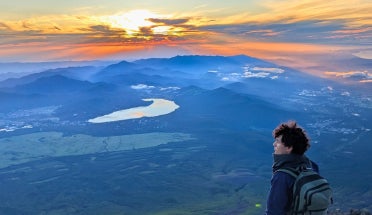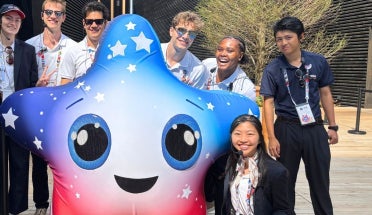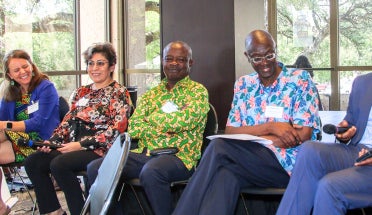
A Day in the Life of Clarissa Salazar ‘16: Peace Corps Volunteer in Cameroon
- Feb 22, 2019
- Peace Corps
Since September of 2017, Clarissa Salazar has been serving in Cameroon, serving as a community health volunteer. Her project involves improving maternal and child health and educating the community on a variety of health topics, such as HIV/AIDS, malaria and nutrition. She is using her health and society degree to improve the lives of women and children in her community.
But Salazar has gained so much more than experiences in the medical field. “Everyone thinks and says, ‘You’re making such a big difference to their lives,’ but in all reality they are changing my life and making the biggest difference,” she said.
Originally from San Antonio, Salazar graduated in December 2016 and started serving a year after. Her experience as a Peace Corps volunteer has made her confident of her passion to work in healthcare and serving the underserved back home.
We asked her what her life as a volunteer is like, the lessons she learned and how Peace Corps will impact her future career.
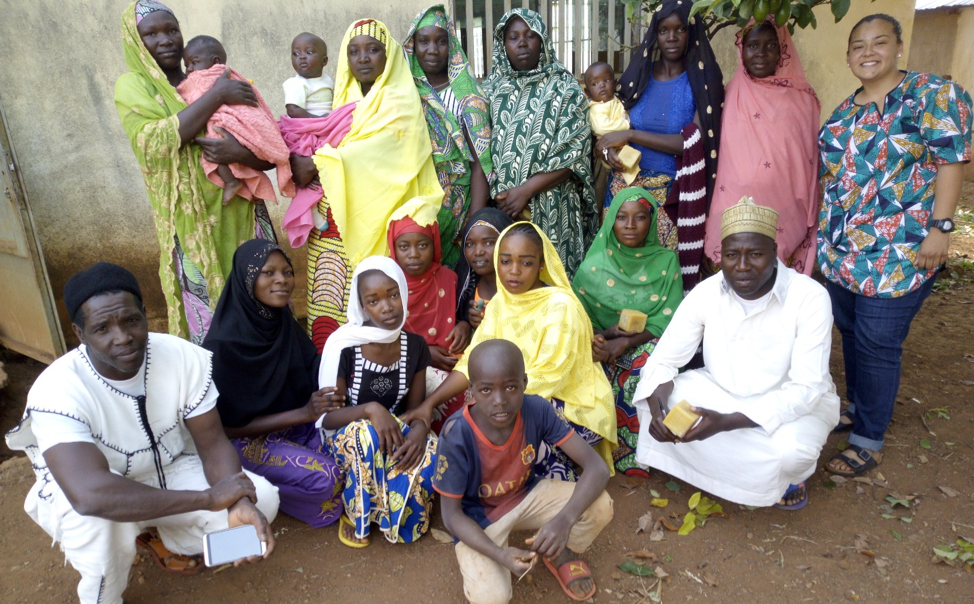
Clarissa, how does your typical day look like?
Since I do not have electricity I have to take advantage of the daylight and start my day early. I get up around 6:30 to fetch water to bathe and to set out my solar panel to charge my power banks and luci lights.
After I have gotten dressed I clean around my house, open my compound door and begin to make breakfast. If I do not have work to do I relax at home, listen to a podcast and eat my breakfast. My neighbors will stop by to say good morning and have small conversations with me. Around 9 a.m., I head out to work (the health center). I live in the center of my village and the health center is about a 20-minute walk outside of my village, so I walk for those 20 minutes and enjoy the fresh air and stop and talk to people as I pass by.
Work at my health center is really dependent on the day. On Mondays, I am the busiest, but on other days it is very relaxed and easy going so I usually will just hang out with my coworkers or help with small things. Sometimes they let me assist on baby deliveries – those are the coolest, but scariest days.
After work, I walk back to the center of town, but instead of going home I go and visit friends (they always feed me, so it’s a plus). I hang out at their houses until 2 p.m. and head home to rest up for a bit before the children are let out of school.
Around 3 p.m. I begin to get many young visitors asking to do my chores, play games or request candy. I hang out with them for a bit, wash up and then leave to spend the evening with my closest friend in the village and her family. I arrive to her house around 5 and help make dinner, we eat around 6:30 and I stay there until 8 p.m. She is fortunate enough to have a solar panel so she has electricity throughout the night. We usually just chat, catch up on Cameroonian soap operas or watch any local football match on the TV. After leaving her house I walk home, lock up, read a bit or catch up on social media then head to bed around 9 p.m.
Why did you decide to join Peace Corps?
I decided to join Peace Corps because I wanted an experience of living and working abroad. I also had done a lot of volunteer work back home in Austin and San Antonio and knew that volunteering was something I was passionate about. When I discovered what Peace Corps was, I instantly knew I wanted to be part of it. I loved everything Peace Corps stood for and decided that I wanted to part-take in the journey.
Describe your community and location.
Cameroon has ten regions and I live in the Adamawa region, it is in the northern part of Cameroon. My community’s population consists of roughly 1,500 people. There is a maternal school, French primary school, bilingual school, and a high school. People in my village make their living off of livestock and agriculture work. My village is very remote and I do not have electricity and must fetch water from a well. The members of my community are predominantly Muslim and do not speak French. Everyone speaks the local dialect ‘Dii’. So, I have learned some Dii while I have been in Cameroon.
My community is pretty flat, there are a few mountains around it, during the dry season it’s very orange- similar to burnt orange. It’s dusty and cold at night. There are straw roof houses, mud blockhouses, and concrete houses. Throughout the town, you can find mango, avocado, papaya and moringa trees.
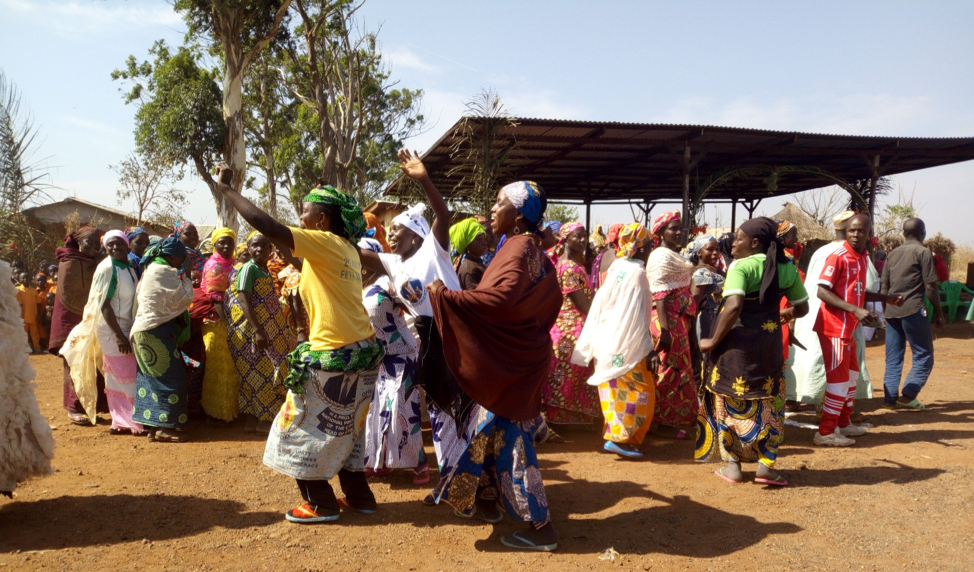
Describe your job.
My primary project is Maternal Child Health (MCH). Every project I plan to do must include my target group, pregnant women and children under 5 years old. I personally work closely with my local health center and carry out most of my projects at the health center or within my actual community.
Every Monday we host prenatal consultations (CPN) for pregnant women and see over 30 women each Monday. This may not seem like a lot, but it actually is, because the culture up here in the Adamawa is very conservative and women do not leave their homes without their husbands’ permission. So seeing all these women come every Monday is very amazing! During these CPN days, I work closely with my counterparts and do health talks; family planning, HIV/AIDS, malaria, exclusive breastfeeding, birth spacing or birth plans, the importance of delivering at the health center, nutrition, etc.
I also do talks every second Wednesday of the month on vaccination days. I have also screened all the children in my village for malnutrition. I work closely with my women and men’s care group and have monthly meetings. Lastly, I help send teenage girls to high school (to avoid early pregnancy and marriage) and teach them how to become peer educators in their community and influence other young girls.
What is your favorite part about being a Peace Corps Volunteer?
Meeting new people. Everyone thinks and says “You’re making such a big difference to their lives.” But in all reality, they are changing my life and making the biggest difference.
What are the hardest parts about being a Peace Corps Volunteer?
Adapting to a new culture, learning new languages, missing home and big family events that are important, and also saying goodbye to all the new people that have become your family in such a short amount of time.
What have you learned about yourself through your service?
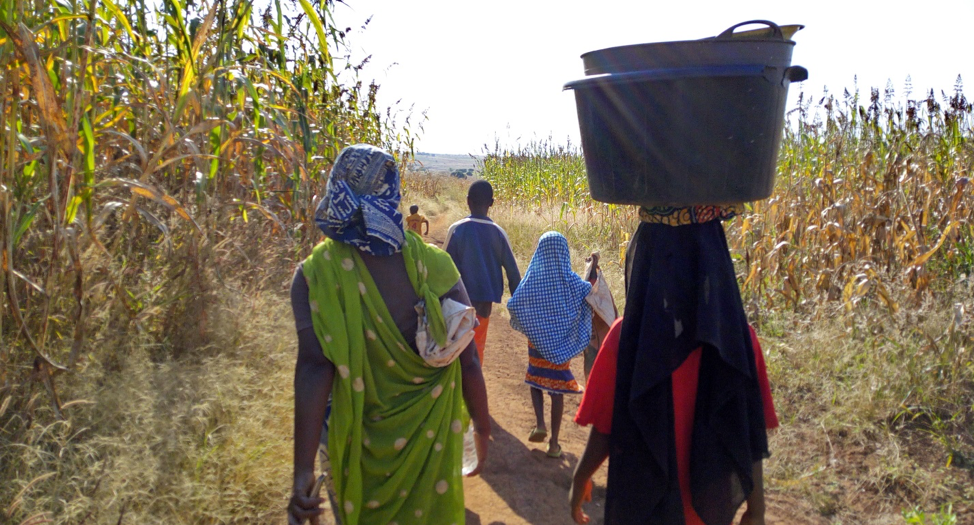
I have learned that I am strong and resilient and can accomplish absolutely anything I set my mind to. I am also very adaptable and can easily adjust to any situation.
I have also learned that a lot of things are out of my control and I shouldn’t stress about things I cannot control.
How will your service impact your career or career goals?
Before I came to Cameroon I knew I wanted to work in the medical field, but after being here for some time now I realize that it’s definitely something I want to do. There are so many people in need in the United States and if I can help in one aspect (medical), then why wouldn’t I?
I know that every job after my service will come with difficulties, but I also know that I am prepared for all the difficulties that are to come because my time in Cameroon has made me strong.
What are your plans after you complete your service?
After my time in Cameroon, I plan on returning back to the United States and continuing my education. I want to pursue a Masters in Health Care Administration, focusing on health care access to the underserved.
What have you gained because of your experience in Peace Corps?
I have gained new friends that are now family, both other PCVs and host country nationals. I have gained a new perspective on the world, especially how ‘Africa’ actually is. I have gained new understandings of new cultures, languages, and people’s ways of thinking. I have gained a total appreciation for everything I have been given in the world and how easy it is in America.
What would you say to current UT students considering applying to Peace Corps?
Peace Corps is one of the hardest jobs you will ever love, but it is worth it! I would say to look into the program that you are most interested in and look up when it is the best time to apply for the program and what the requirements are. I recommend reaching out to RPCV’s who have served in the country or sector they are interested in to get insight about the way Peace Corps works.

